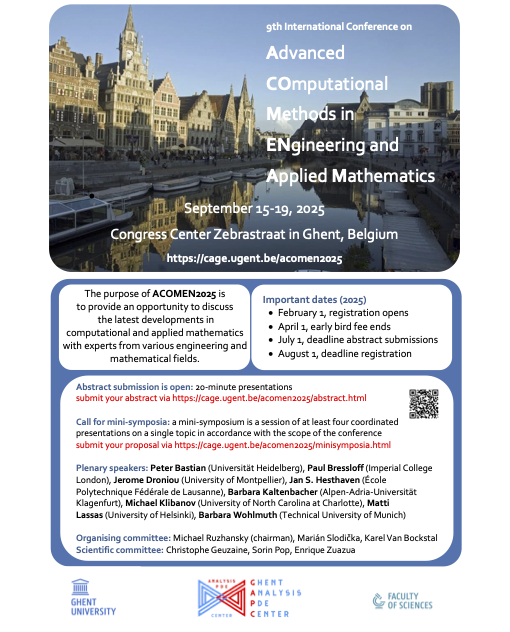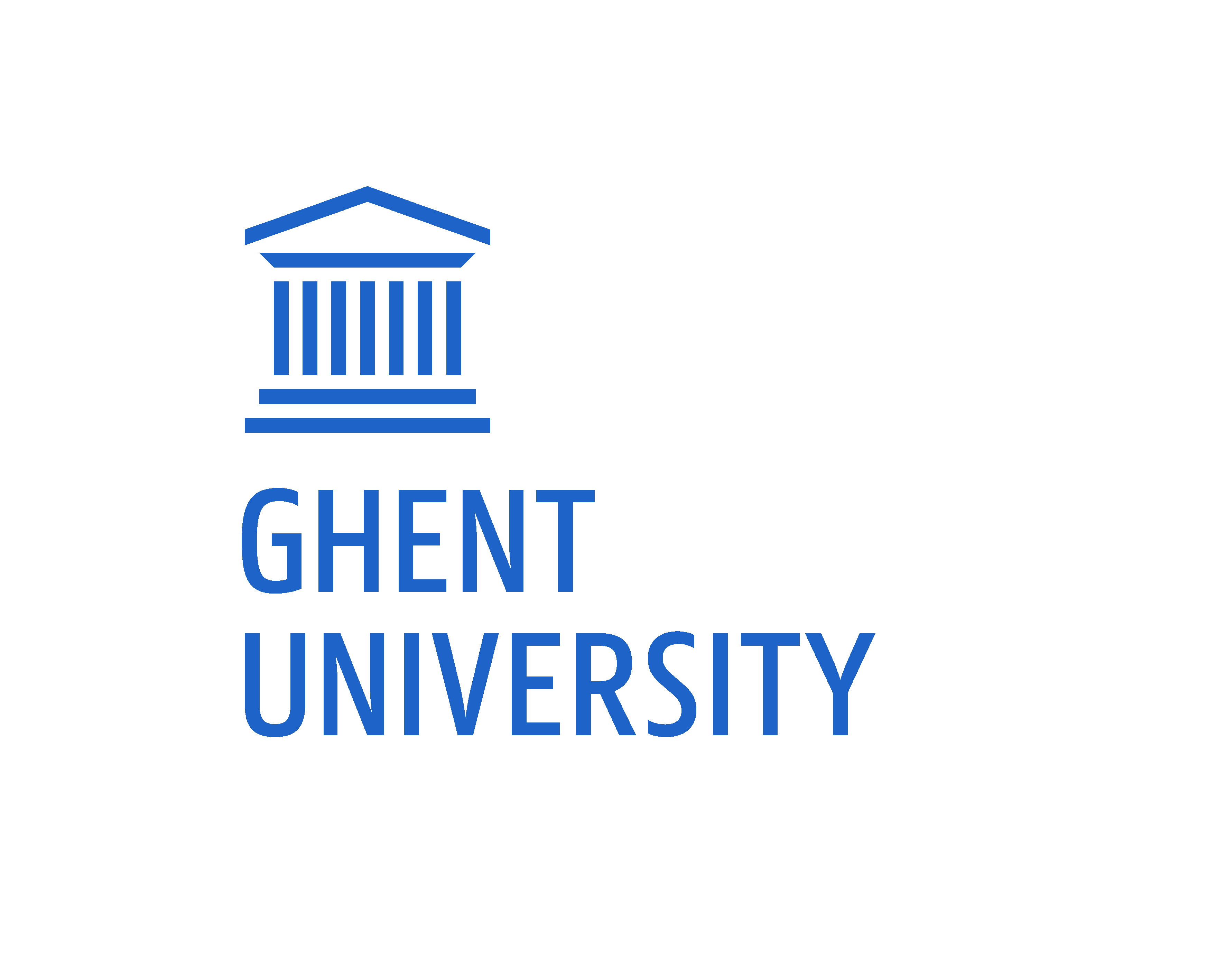Mini-symposia
A mini-symposium is a session of at least four coordinated presentations on a single topic of substantial current interest, in accordance with the scope of the conference.
List of approved mini-symposia
OS - Open Session
Abstract:
Open session.
MS1 - Numerical and computational methods for wave equations
Chair: Kristof Cools and Le Van Chien (Ghent University)
Abstract:
The rapidly rising variety of acoustic and electromagnetic applications has demanded the high-precision computing capacity of wave equations in complicated scenarios,
for instance, modelling and analyzing systems in the presence of wide bandwidth data, large-scale, multi-scale and multi-physics geometries with complex material properties.
This demand has accelerated the critical need for studies of robust, stable and highly efficient computational methods, necessitating more and more efforts from both mathematicians, physicists, computer scientists, and engineers.
Within this mini symposium, we aim to bring together international experts in the field of numerical and computational methods for acoustic and electromagnetic wave equations to discuss the latest research and knowledge, explore
challenges and new directions, as well as to foster interaction and collaboration between communities. The topics of this mini symposium cover both frequency-domain and time-domain challenges, with a particular focus on finite and boundary element methods.
MS2 - Advancements in Neural Network Solvers for PDEs: Applications and Challenges
Chair: Minseok Choi (Pohang University of Science and Technology) and Jooyoung Hahn (Czech Technical University in Prague)
Abstract:
This symposium addresses recent developments and persistent challenges in using neural network solvers for partial differential equations (PDEs),
with a particular focus on the limitations and potential of physics-informed neural networks (PINNs).
Despite their innovative approach, PINNs often face significant hurdles such as poor convergence,
dependency on large data sets, and difficulties in generalizing across different types of PDEs.
The session will examine how integrating classical mathematical concepts and numerical methods has begun to overcome these issues,
enhancing the robustness and accuracy of neural network approaches. The discussion will highlight the latest adaptations in neural networks that
incorporate advanced sampling strategies, optimization of network architectures,
and novel training techniques that reduce the computational burden. Additionally, the symposium will present specific applications
where modified PINNs have shown improved performance in solving complex, nonlinear PDEs in real-time scenarios,
and in sensor placement strategies that optimize data acquisition in sparse environments.
By bringing together diverse perspectives from applied mathematics and engineering, the session aims to provide a
comprehensive understanding of how traditional numerical methods can be seamlessly integrated with modern machine learning techniques
to address some of the most challenging problems in scientific computing.
MS3 - Modelling, simulation and analysis of inertial particle dynamics
Chair: Anna Klünker (Leuphana University Lüneburg) and Vamika Rathi (Hamburg University of Technology)
Abstract:
Inertial particles exhibit distinct transport behaviors compared to passive or ideal fluid particles.
Their study is critical for a wide range of applications, from industrial processes like chemical reactors to natural phenomena such as marine snow or
the transport of micro- or macro plastics in the ocean. This mini-symposium will discuss recent advancements in the mathematical modelling, simulation,
and analysis of inertial particle transport across various applications. Talks will present novel numerical approaches for solving the Maxey-Riley equation,
a key model to describe the motion of small inertial particles. They will also present various Lagrangian analysis tools that have been developed in the last
decades to investigate transport and mixing in fluid flows. These tools provide valuable insights into the dispersion patterns of inertial particles, offering
a deeper understanding of their complex behaviors in fluid systems.
MS4 - Implicit high-order time integration for hyperbolic PDEs
Chair: Jochen Schütz (Hasselt University) and Peter Frolkovic (Slovak University of Technology)
Abstract:
Traditionally, time integration for hyperbolic PDEs has been done using explicit time integration schemes.
While these schemes are easier to analyze and implement, and very often yield highly efficient algorithms,
they can suffer from severe stability restrictions when the underlying PDE becomes stiff due to, e.g., large wave speeds,
large sources, geometries with high aspect ratio and the like. Recent years have hence seen much progress in the development
and analysis of implicit time integration for hyperbolic (and related) PDEs. This minisymposium aims to bring together
researchers that work on implicit, semi-implicit or implicit/explicit (IMEX) time integration for PDEs, with a particular focus on hyperbolic PDEs.
MS5 - Nonlinear Acoustic Waves: Modeling, Analysis, and Numerics
Chair: Barbara Kaltenbacher (University of Klagenfurt) and Vanja Nikolić (Radboud University)
Abstract:
The research on nonlinear acoustics has mainly been driven by numerous
developing applications of ultrasound waves, including imaging, non-invasive
therapy, and targeted drug delivery. In recent years, significant advances
have been made in the mathematical aspects of nonlinear acoustics, and
new, challenging open questions have been raised in the areas of accurate
modeling, rigorous analysis, and efficient simulation. This minisymposium
aims to bring together researchers working on this topic to encourage novel
ideas, trends, and cooperation in this field.
MS6 - New generation methods for numerical challenges in curl-div problems: Electromagnetism, MHD, and derived models
Chair: D. Di Pietro (University of Montpellier), L. Beirao da Veiga (University of Milano-Bicocca), P. Antonietti (Politecnico di Milano) and J. Droniou (University of Montpellier)
Abstract:
Electromagnetic models display specific structures that challenge their mathematical analysis. The well-posedness of
stationary versions (such as magnetostatics) depend on the topology of the domain - typically, the number of holes in it.
Transient versions comprise two types of equations: evolution and constraints (divergence condition on the fields),
the latter being preserved by the former. When considering charged fluids, electromagnetic and Navier-Stokes equations are coupled,
giving rise to complex non-linear magnetohydrodynamics equations that also present certain structures of interest, such as the preservation
of helicity. Other nonlinear equations also arise in the context of generalised electromagnetic models, such as the Einstein equations.
Most of these structures and complexities stem from the fact that electromagnetic equations are based on "incomplete" operators:
the curl and the divergence. The properties and relations between these two operators, which explain the aforementioned
structures, are embedded into the de Rham complex and its cohomology.
Designing robust and accurate numerical methods for electromagnetic (and related) models is a complex task, and it requires to properly
represent at the discrete level the underlying mathematical structures. This necessitates suitable discretisations of the divergence and
curl, and the resulting schemes often lead to indefinite linear systems that present severe computational challenges.
This minisymposium will focus on numerical and computational aspects of models involving the curl and divergence operators,
with emphasis on electromagnetic and magnetohydrodynamics models. Topics covered include the design and analysis of numerical
methods for these models, considerations around the preservation of structures at the discrete level, computational challenges, etc.
MS7 - Model reduction via moment closures with application to complex transport phenomena based on kinetic theory and free-surface flows
Chair: Julian Köllermeier (Ghent University and University of Groningen)
Abstract:
Many high-dimensional applications involving kinetic descriptions of complex transport phenomena,
such as non-equilibrium gas flows, polydisperse and polykinetic sprays, and radiative heat transfer,
require model reduction to allow for efficient simulations of the multiscale underlying physics.
Free-surface flows with complex velocity profiles are another application area that benefits from reduced models.
Moment closures are one way to derive lower-dimensional PDEs that enable this efficiency while allowing
for analytical derivation with physical insight. This minisymposium covers recent advances in moment
closure techniques for diverse applications. The focus is not only on the derivation and analysis of the
closures but also on the numerical schemes and simulation results.
MS8 - Recent Trends in Mathematical Software
Chair: Andrew Dienstfrey (National Institute of Standards and Technology) and Amparo Gil (Universidad de Cantabria)
Abstract:
Numerical software lies at the foundation of nearly all scientific computing applications.
This minisymposium will showcase recent advances in the development and analysis of numerical algorithms across
a range of problem areas including: numerical linear algebra, Monte Carlo methods for PDEs, and numerical software for special functions and Gauss quadrature.
This minisymposium is being organized by members of the International Federation of Information Processing Working Group 2.5 on Numerical Software.
MS9 - Advanced Numerical Methods for Flow and Related Problems
Chair: Marius Paul Bruchhäuser (Helmut Schmidt University Hamburg), Nils Margenberg (Helmut Schmidt University Hamburg), Richard Schussnig (Ruhr University Bochum)
Abstract:
Accurate and efficient numerical solution methods for large-scale flow
simulations remain a challenging task. Flow phenomena arise in numerous
scientific and engineering fields including mechanics, environmental
science, biology, and medicine. Ongoing progress in these fields is
closely linked to the evolution of increasingly complex models.
Handling these problems demands innovative numerical and computational
methods. With the increasing availability of high performance computing
hardware, efficient computational methods for large-scale flow
simulations become crucial in order to achieve optimal performance and
save cost and time. The achievement of this goal further depends on the
numerical discretization, which is required to be accurate, stable and
should be able to capture fine scales and complex physics. In this
regard, standard or naive approaches often prove inadequate.
This minisymposium consists of contributions to the mathematical and
computational innovations in the complex simulations associated with
flow and related problems. The main focus is on the development and
rigorous analysis of state-of-the-art numerical methods and solvers
using high performance and extreme scale computing techniques. Modern
techniques like highly parallel scalable domain decomposition methods,
matrix-free multigrid methods, goal-oriented space-time adaptivity and
adaptive stabilized methods are of particular interest.



